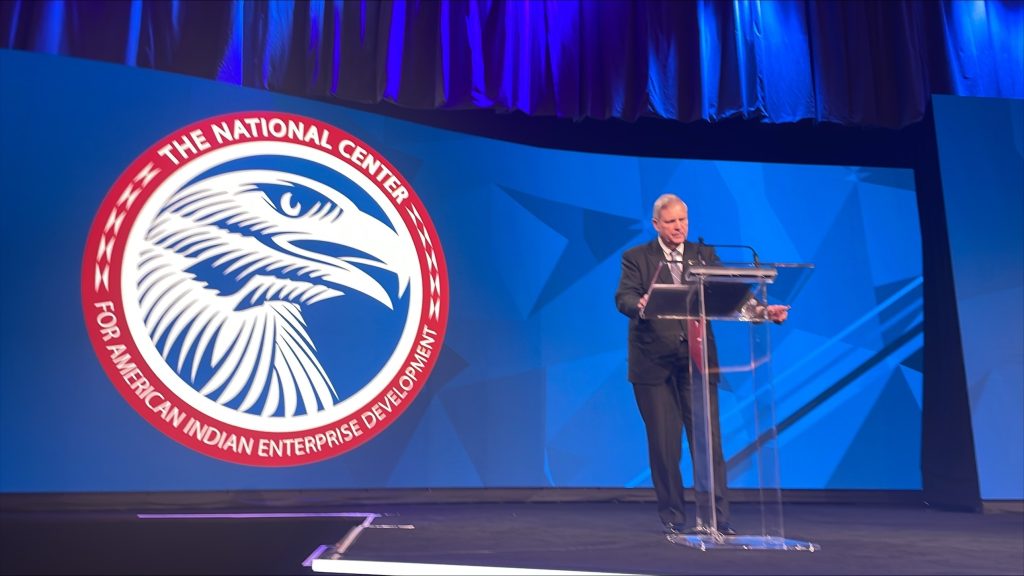Podcast: Play in new window | Download | Embed
Indian Country business is getting done in Las Vegas this week, as more than 4,000 people are gathered for the 2024 Reservation Economic Summit.
It’s put on by the National Center for American Indian Enterprise Development.
The summit features tribal leaders, members of Congress, federal agency representatives, state and local officials, and top CEOs all gather together on a national platform.
Attendee Henry Jake Foreman is the program director for New Mexico Community Capital based in Albuquerque, which assists Native-owned businesses.
He says an important goal for his non-profit in the next year is to connect with high urban Indigenous communities.
The organization is building a technology hub in downtown Albuquerque, which is a co-working space and an innovation spot.
He says they’re also seeking to expand hubs beyond New Mexico.
“Phoenix, Ariz., they have one of the highest urban Indigenous populations, so we also want to create a hub there as well. We’re looking to Oakland, Calif. where we’ve done programming in the past. We’re traveling to Oklahoma City next week as well as Alaska.”
Also during the summit, U.S. Secretary of Agriculture Tom Vilsack announced the Biden Administration is investing $58 million in tribal communities in Nevada, Oklahoma, and South Dakota to provide clean drinking water, sanitary wastewater systems, and affordable high-speed internet.
Sec. Vilsack says that when it comes to helping a community grow economically, access to clean water and water sanitation should be a no brainer.
“Making sure that tribes have access to water and wastewater treatments, absolutely essential to the economic opportunity and development.”
As for high-speed internet, Sec. Vilsack says that regardless of how small or rural a community is, access to high-speed internet is crucial, and that working with the Reconnect Program is going to help make that happen.
“You cannot have a modern economy without access to high-speed internet. And I think the President has been very clear about this. He wants all areas, regardless of how remote they may be, to have access to this incredibly important tool.
RES wraps up on Thursday.
WATCH Native America Calling live from RES today at 1 p.m ET and a special web exclusive panel at 5 p.m. ET
Are you at RES this week? Meet us at booth #423

Ryan Metoxen-Hamilton, left, and his brother Deven Metoxen-Hamilton process samples together. (Photo: Lina Tran / WUWM)
Bitter cold keeps bugs at bay, but climate change is giving invasive pests like emerald ash borer a leg-up — which can cause serious economic damage.
After Wisconsin’s warmest winter on record, Lina Tran of member station WUWM reports on how tribes in the state are keeping track of the problem.
Warming winters have encouraged the spread of invasive pests like the tiny, green ash borer beetle. That makes fending off pests harder.
Tracking their spread is a key part of the effort.
Melissa Johnson (Oneida) is with the Wisconsin Tribal Conservation Advisory Council.
She leads a pest survey across tribal land in the state.
Before it started about five years ago, tribal forests weren’t included in the state-run surveys.
“The tribes, the more knowledge they have about their land, the better. And it’s not like an insect knows reservation boundaries or county boundaries.”

A mix of antifreeze and water helps immobilize and preserve the trapped insects until they are processed. (Photo: Lina Tran / WUWM)
What they find helps inform tribal forest management and preserve black ash wood, which Haudenosaunee tribes have used to weave baskets for thousands of years.
Last July, I met Johnson and her interns at a wild, grassy field in the Oneida reservation.
Deven Metoxen-Hamilton is a senior at UW-Stevens Point and an Oneida citizen.
He checks a trap hanging from an oak tree.
He almost wants his summer job to be boring — he doesn’t want to find anything.
“Like, it feels good to be doing this. But then again, it’s like if you find something, it’s a good thing and a bad thing. Bad that it’s here. Good that you’ve detected it early.”
All morning, the team drives to different sites.
None of them identify as “bug people.” They’re doing this because of the threat that non-native bugs pose to the trees and birds that they love.
Get National Native News delivered to your inbox daily and stay up-to-date on the 2024 Native Vote. Sign up for our daily newsletter today.



